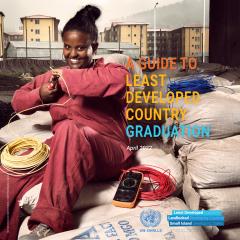The Office of the High Representative provides policy advice and coordinates UN System support to graduating LDCs. It also provides secretariat support to the consultations on General Assembly Resolutions on graduation of countries from the LDC category. The Office also prepares a triennial Secretary General Report on LDC Graduation. Consult the 2021 SG Report on LDC Graduation (A/76/271).
The United Nations Committee for Development Policy (CDP) reviews the LDC Category every three years to monitor LDC member countries’ progress against measurements of income, human assets and vulnerability. For more information on these measurements, see the CDP Secretariat (DESA) website here.
Every three years, the CDP submits its recommendations on which countries should be classified as LDCs to the United Nations Economic and Social Council (ECOSOC). The UN General Assembly takes the final decision on graduation of countries out of the LDC category.
To reach eligibility for graduation, a country must reach threshold levels for graduation for two of the three criteria in two consecutive triennial reviews. A country may also graduate based on the income criterion alone if it exceeds three times the income threshold and satisfies an assessment that the revenue is sustainable.
There is no automatic application of the graduation criteria and additional information is considered by the CDP before making its recommendations. The views of the graduating country are considered in this process.
The standard process determined by General Assembly resolution 59/209 in 2004 prescribes a three-year period between meeting the graduation criteria for the second time and the date of effective graduation. However, the General Assembly has granted exceptional extensions of transition period before graduation, mainly due to the occurrence of significant external shocks derailing socioeconomic progress of the graduating countries.
The COVID-19 global pandemic was the most recent and cogent example, causing lingering negative development impacts on LDCs, including reversal of progress towards sustainable development, which also affects the prospects of graduation. For a comprehensive overview of all UN decisions on graduation of LDCs, see this document.



